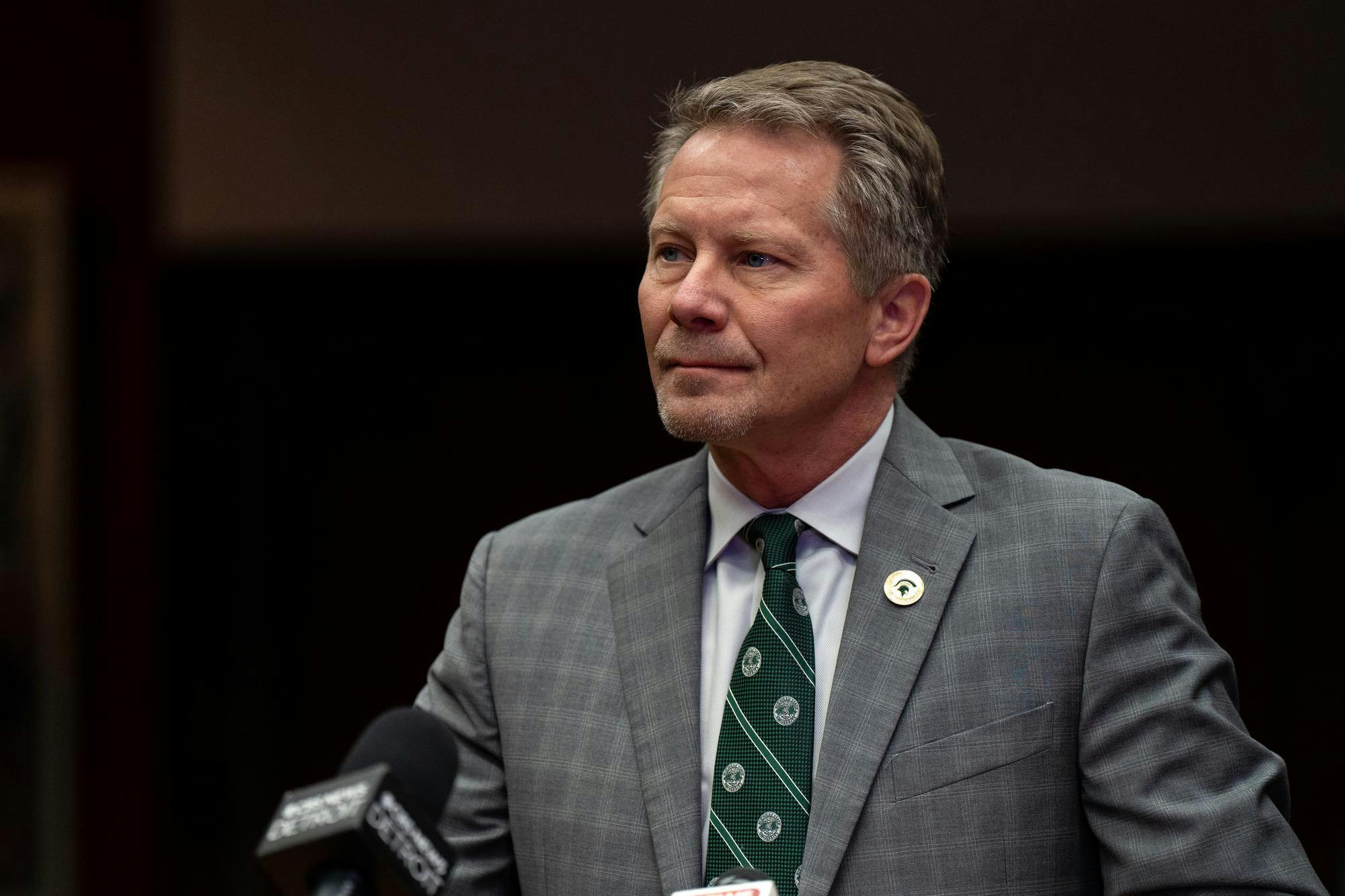To account for those woes, they suggest finding $150 million in budget cuts or sources of new revenue. Their specific proposals include “university-wide research agendas” and a set of splashy projects designed to bolster the image of MSU and its new president, Kevin Guskiewicz.
Since he started in March, Guskiewicz’s administration has made little action. His first months were defined by “listening and learning,” as he put it, with a tour of the university where he heard about various departments’ ongoing projects and future ambitions. He has not yet laid out concrete proposals to be implemented under his leadership.
That will happen at the end of September, at Guskiewicz’s presidential investiture: a ceremony where a new leader is formally “vested” with the official powers of the presidency.
While Guskiewicz has not yet decided what he will announce, a spokesperson said, the consultants' suggestions provide the first detailed look at the ideas he's considering.
McKinsey broke their recommendations into two categories.
“Quick wins” are short term projects that could be promised this fall and delivered on soon after. These include a competitive scholarship program that would “award {#} undergraduate students a full ride.” Another such idea is further monetization of MSU’s prestigious Facility for Rare Isotope Beams, with an investment in “the commercial applications of FRIB isotopes.”
“Signature initiatives” are longer term projects that “the president will be ‘known’ for publicly.” They could help MSU increase its overall enrollment and impress lawmakers responsible for the university’s lagging state appropriation.
It’s unclear if McKinsey will stick around to implement selected ideas.
In April, MSU paid the firm $2 million for the first phase of their work. McKinsey has given MSU proposals for two more phases, each more intensive and requiring separate fees. The university is still “evaluating” if it will pursue those, spokesperson Emily Guerrant said.
The State News obtained records of McKinsey’s work thus far — slideshows, memos, contracts and invoices — through public records requests.
McKinsey is a member of the “big three,” a prestigious circle of management consulting firms sought after by businesses, but criticized by some for their greater social impact. McKinsey’s private sector work, for example, includes infamously effective advice to pharmaceutical companies hoping to “turbocharge” opioid sales. That work has since led to a nearly $600 million settlement to affected states from Mckinsey and spurred a new criminal investigation into the firm.
In recent years, firms like McKinsey have also offered a growing set of services advertised to higher education clients. In 2014, The Chronicle of Higher Education added consultants like McKinsey to its “influence list” of people reshaping the sector. Since then, the firm has had multiple costly contracts with public universities. A $14 million contact at the University of Arizona raised faculty eyebrows in 2019. And, a $7.2 million contract at the University of Florida is currently prompting calls for an investigation of former president Ben Sasse’s spending there, among other questionable expenses.
While the hefty price tags have soured some, consultants like McKinsey can give college leaders unique insight, said Ronald G. Ehrenberg, the founding director of Cornell University’s Higher Education Research Institute.
“Most leaders, below a few key central administrators, are fully engaged with keeping their divisions running” day-to-day, he said in an email to The State News. Asking them to do the sort of long term planning McKinsey is doing for MSU could be impractical.
Consultants also bring a knowledge of what has and hasn’t worked at other universities they’ve advised, while administrators may only know their own institutions, he said.
In a recent interview with The State News, Guskiewicz said he tapped McKinsey to assist him because of that comparative ability. He said he was impressed by their benchmarking, a systematic comparison of metrics at various universities.
“I’m really big into benchmarking, because I’m coming in having not been here, trying to learn this university,” he said.
‘Financial stability’
Support student media!
Please consider donating to The State News and help fund the future of journalism.
To “create financial stability and run an efficient organization,” Guskiewicz must find new revenue or cuts totaling $150 million, or about 5% of MSU’s annual budget, McKinsey wrote in a memo.
One way to do that is with a new “incentive based budget model,” the firm suggested. Those systems generally redirect funding year-to-year based on metrics, such as the productivity of a given department or the credit hours offered by a college.
The University of Colorado Denver, for example, told departments hoping to succeed under its new incentive model to grow their enrollment and prioritize “market driven programs.”
McKinsey also proposes shifting MSU’s financial footing with “longer-term org changes.” The firm doesn’t list any specific proposed staffing changes, except one suggestion that Guskiewicz “define a new top team” of high level administrators to “enable strategic conversations and ensure the president's time is spent on priority areas.”
Researchers falling behind
Another issue McKinsey urges Guskiewicz to take action over: lagging research productivity.
MSU’s average R&D expenditure, the amount of money spent on research, per employee is $192,000. The American Association of Universities' average is $632,000.
McKinsey also found problems within that dawdled sum, with 73% of awards coming from just the top 10% of faculty. The issue is most prevalent in the humanities, where the top 10% of faculty bring in 97% of awards.
To solve the issue, McKinsey suggests MSU should “find the next FRIB” with an ambitious new “university-wide research agenda.”
If selected well, the firm argues the agenda will “reengage existing mid-career faculty in research” and help MSU strategically hire new faculty in the fruitful area.
McKinsey’s suggested areas are:
-
Women’s Health: The College of Human Medicine’s OB-GYN department was No. 1 in 2023 NIH funding, and MSU’s former Interim President Teresa Woodruff is one of the nation’s leading female fertility experts, receiving a Presidential Award for Excellence from Barack Obama in 2011, the firm points out.
-
Agriculture: MSU’s plant sciences and AgBio programs are well regarded and closely associated with the university as a historic land-grant institution, the firm argues.
-
Microelectronics: MSU is already in an 11-school, multi-state semiconductor partnership.
-
Health Equity: funding from the federal Department of Health and Human Services is fast-growing and MSU has already established a center for research equity in cancer treatment, the firm argues.
-
Physics: instead of “finding next FRIB,” the firm also posits that MSU could further commit to the FRIB as it is already the university’s largest source of federal funding.
What the president is ‘known for’
McKinsey also proposes a number of “signature initiatives” that Guskiewicz would announce at his investiture and be “known for publicly.”
In March, Guskiewicz told The State News that he believed a big public initiative could help MSU lobby lawmakers to increase its state appropriation, which for years has lagged behind other public universities in per-student funding.
McKinsey’s proposals are:
-
“Enroll for the future:" An enrollment and financial aid strategy aimed at increasing MSU’s yield rate of admitted students. Declining Michigan high school populations could cut into MSU’s future enrollment if something isn’t done now, the firm argues.
-
“Spartans Thrive:" A student retention program aimed at reducing the number of students who leave MSU after one or two years, which is currently 16% percent. The most recent survey data shows that the number one reason for dropping out was financial, making new scholarship programs a potential tool for retention, the firm argues.
-
“Green and White Council:” A council of high profile politicians, business-people, and donors tasked with advising MSU on how it can help improve Michigan’s GDP. MSU has a growing footprint across the state, and could be a big part of improving the overall economy, the firm argues.
-
“Grow MSU, Grow Michigan:” An increased commitment to adult learners with professional programs. MSU could help fill Michigan’s workforce gap by providing the sort of training people need for growing fields, the firm argues.
-
“From the Upper Peninsula to Detroit:” A plan to “maximize MSU’s physical presence across the state.” The university should seek new real estate in the northern lower peninsula, which will soon have the highest job growth rates, the firm suggests.
It hasn’t been decided which, if any, Guskiewicz will commit to at the investiture, said Guerrant, the spokesperson. Those that aren’t announced aren’t necessarily dead, as they could “be on a shelf for six months or a year” and then be revisited.
Discussion
Share and discuss “MSU needs splashy project, more research and budget balance, consultants say” on social media.







